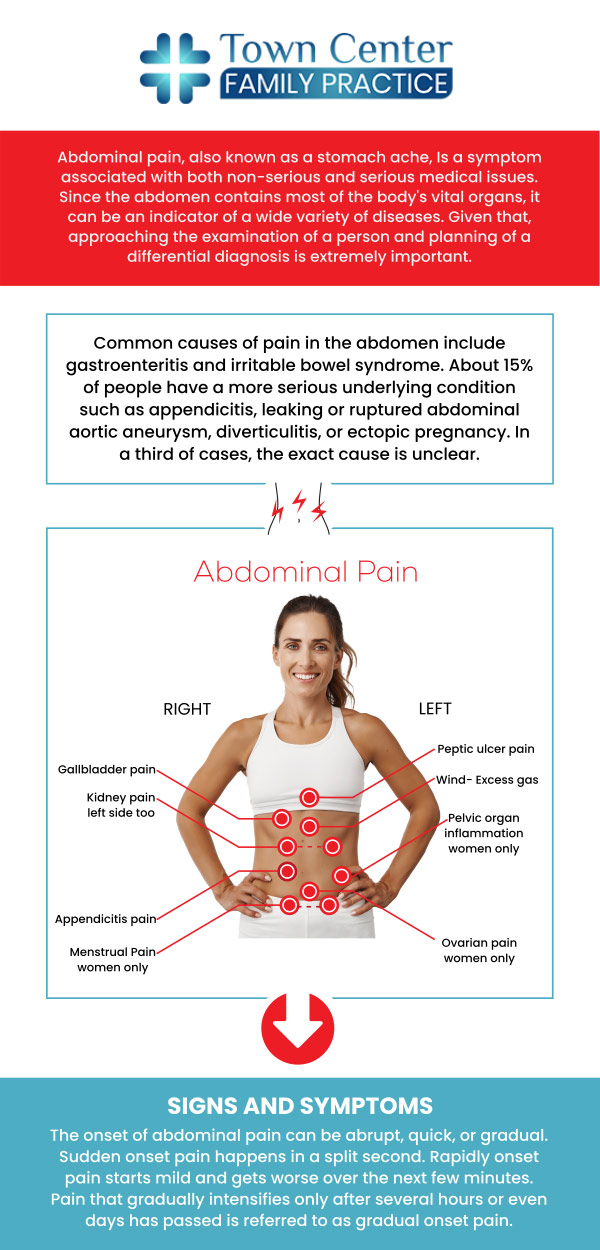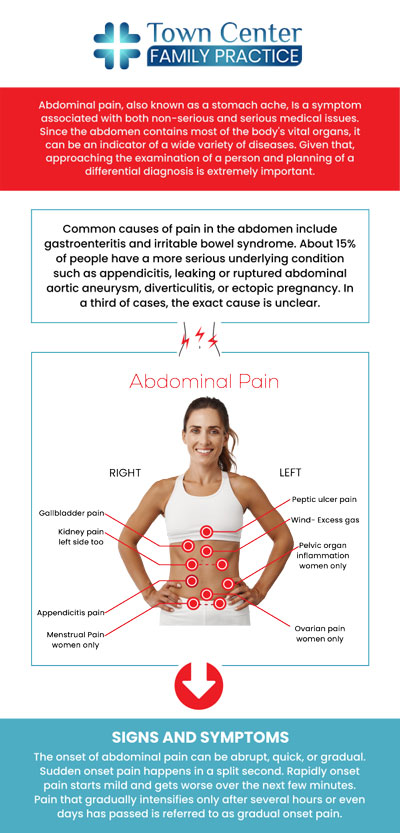What Causes Lower Abdominal Pain in Females?
Lower abdominal pain in females can stem from various factors, including gastrointestinal issues and gynecological conditions such as ovarian cysts, endometriosis, or menstrual cramps. Other possible causes include urinary tract infections, digestive disorders, and pelvic inflammatory disease. For accurate diagnosis and effective treatment, visit Dr. Neetu Singh, MD. Schedule an appointment online or contact us for more information. We are conveniently located at 1642 N. Volusia Ave, Orange City, FL 32763.


Table of Contents:
When should women see primary care for lower abdominal pain?
Can primary care diagnose the causes of lower abdominal pain in women?
What exams do primary care doctors perform for lower abdominal pain in women?
Does primary care manage chronic lower abdominal pain in women?
A woman should seek primary care evaluation for lower abdominal pain, especially when the discomfort is persistent, severe, or comes with symptoms such as fever, nausea, vomiting, abnormal vaginal bleeding, unusual vaginal discharge, or painful urination. If your pain interferes with daily activities, worsens over time, or is associated with missed periods, possible pregnancy, or a history of gynecological conditions, it is important to consult your healthcare providers promptly.
Some causes of lower abdominal pain—such as ovarian cysts, pelvic inflammatory disease, urinary tract infections, or appendicitis—require timely diagnosis and management. If you experience sudden, sharp, or intense pain, or symptoms like dizziness, fainting, or shoulder pain, seek emergency care immediately, as these could indicate more serious conditions like an ectopic pregnancy.
At Town Center Family Practice, our team is dedicated to providing comprehensive evaluation and care for women’s health concerns. Early assessment by our primary care providers ensures an accurate diagnosis, effective treatment, and helps prevent potential complications.
Many common causes of lower abdominal pain in women—such as urinary tract infections, gastrointestinal disturbances, or gynecological issues like ovarian cysts—can be identified or strongly suspected at primary care. The clinicians carefully evaluate the pattern, location, severity, and duration of your pain, as well as any associated symptoms like fever, urinary changes, abnormal vaginal bleeding, or gastrointestinal complaints.
Based on your individual needs, your providers may recommend further testing, including urine tests, pregnancy tests, blood work, or pelvic ultrasounds, to help determine the underlying cause of your symptoms.
At Town Center Family Practice, we are committed to playing a crucial role in the initial diagnosis and management of lower abdominal pain in women, ensuring you receive timely and appropriate care—and guiding you to specialty care when necessary.
When you visit primary care with concerns about lower abdominal pain, the team begins with a comprehensive medical history. They will ask detailed questions about the onset, duration, and nature of your pain, as well as any related symptoms such as fever, vaginal discharge, changes in urination, menstrual cycle details, and recent sexual activity. They also review your past medical and surgical history, current medications, and any potential recent exposures to infections.
Next, one of the providers will perform a careful physical examination, check your vital signs for fever, low blood pressure, or rapid heartbeat—signs that may indicate a more urgent situation. Abdominal exam focuses on gently assessing areas of tenderness or swelling, especially in the lower abdomen. This helps pinpoint the location and possible cause of your discomfort.
For many women, a pelvic examination is an important step in the evaluation. The pelvic exam allows us to look for signs of infection, inflammation, or other abnormalities affecting the uterus and ovaries. When necessary, additional exams, such as a rectovaginal assessment, may be performed to ensure a complete evaluation.
Based on the findings, further testing may be recommended. This could include urine analysis, pregnancy testing, screening for sexually transmitted infections, blood work, or imaging studies such as an ultrasound—all of which can be arranged conveniently through the practice. These diagnostic tools help accurately identify the underlying cause of a patient’s symptoms.
Primary care providers can manage chronic lower abdominal pain in women, but they typically start by identifying the underlying cause. Chronic abdominal pain in women can arise from a variety of conditions, including gastrointestinal disorders, gynecological issues, urinary tract problems, or even musculoskeletal pain. Primary care providers conduct thorough assessments, including physical exams and detailed health history reviews, to determine the cause.
If necessary, further diagnostic tests such as imaging studies, lab work, or referrals to specialists may be recommended. Treatment approaches often focus on symptom management, lifestyle changes, medication, and, in some cases, referrals to specialists like gynecologists or gastroenterologists for more advanced care. Primary care providers play a key role in coordinating care and ensuring that women with chronic lower abdominal pain receive the most appropriate treatments.
For women experiencing chronic abdominal pain, early intervention through primary care is vital for improving quality of life and preventing more serious complications. Regular follow-up appointments help track progress and adjust treatments as needed.
Our goal at Town Center Family Practice is to provide comprehensive care for women experiencing chronic lower abdominal pain, from initial assessment through ongoing management and specialist coordination when needed. We are committed to your health and well-being every step of the way. Book an appointment online or contact us for more information. We are conveniently located at 1642 N. Volusia Ave, Orange City, FL 32763. We serve patients from Orange City FL, DeLand FL, Deltona FL, DeBary FL, Lake Monroe FL, Sanford FL, and surrounding areas.
Check Out Our 5 Star Reviews


Additional Services You May Need
▸Primary Care
▸Pediatric Care
▸Wellness
▸Family Services
▸Asthma
▸Sports Physicals
▸Respiratory Illnesses
▸EKG’s
▸Chronic Care Management
▸Physical Examinations
▸Pregnancy Testing
▸Prostate Cancer Screening
▸Women’s Wellness Examinations
▸Geriatric Physicals
▸Cardiac Risk Assessment
▸School Physicals
▸Diabetic & Lipid Management
▸Immunizations
▸Pediatric Annual Physical Exam
▸Same Day Sick Visits
▸Telehealth
▸Direct Primary Care
▸Asthma (Acute episodes)
▸Asthma (Long-term management)

Additional Services You May Need
▸Primary Care
▸Pediatric Care
▸Wellness
▸Family Services
▸Asthma
▸Sports Physicals
▸Respiratory Illnesses
▸EKG’s
▸Chronic Care Management
▸Physical Examinations
▸Pregnancy Testing
▸Women’s Wellness Examinations
▸Geriatric Physicals
▸Cardiac Risk Assessment
▸School Physicals
▸Diabetic & Lipid Management
▸Immunizations
▸Pediatric Annual Physical Exam
▸Same Day Sick Visits
▸Telehealth
▸Direct Primary Care
▸Asthma (Acute episodes)
▸Asthma (Long-term management)



